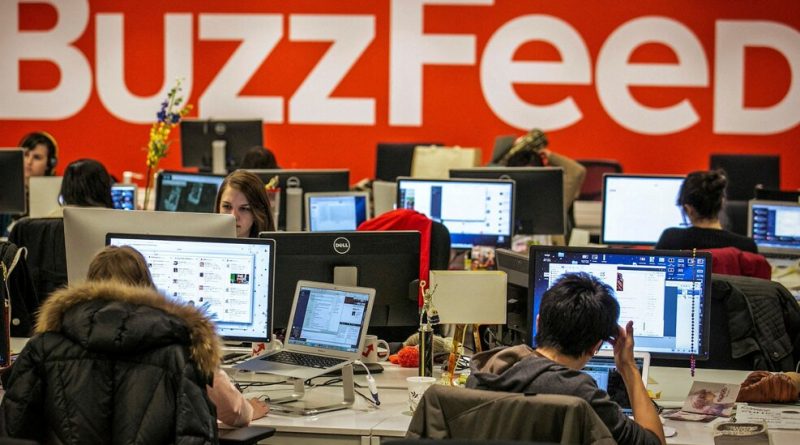BuzzFeed Shuts Down Its Namesake News Division
BuzzFeed is shutting down its namesake news division, which won acclaim for its journalism but fell prey to the punishing economics of digital publishing that has laid low many of its peers.
Jonah Peretti, BuzzFeed’s chief executive, said in an email to employees on Thursday that he was closing BuzzFeed News as part of a broader round of cuts at the company. About 60 people will be affected by the shuttering of the news division, some of whom will be offered jobs at other parts of the company.
BuzzFeed’s decision is the latest in a series of financial setbacks faced by digital media companies. Once the focus of enormous optimism and investment from industry titans including Disney and Comcast, new-media firms like BuzzFeed, Vox Media and Vice have failed to live up to their formerly lofty valuations.
The media industry writ large has pivoted to focus on streaming, and digital advertising — a mainstay for digital publishing companies — is increasingly going to tech platforms such as Instagram and TikTok.
Also on Thursday, Insider announced that it was laying off 10 percent of its staff, a move the company attributed to broader economic headwinds. Buzzfeed’s layoffs will affect 15 percent of the company’s work force, or some 180 people across its business, content, tech and administrative teams.
BuzzFeed was part of a rising crop of media companies that capitalized on the growing dominance of tech platforms to deliver audiences to their stories, betting that profits would follow. But those tech titans, including Meta, Alphabet and Bytedance, reaped most of the value from the massive audiences their platforms attracted, and the profits those massive audiences suggested never materialized.
In his memo, Mr. Peretti said he “made the decision to overinvest” in BuzzFeed’s news division because he loved the work it produced but acknowledged that he had been slow to accept that social media platforms would not provide the financial support needed to make Buzzfeed News profitable.
“I’ve learned from these mistakes, and the team moving forward has learned from them as well,” Mr. Peretti wrote. “We know that the changes and improvements we are making today are necessary steps to building a better future.”
BuzzFeed will continue to publish news on HuffPost, which Mr. Peretti said in his memo was profitable and less dependent on social platforms. He added that the company was moving forward “only with parts of the business that have demonstrated their ability to add to the company’s bottom line.”
BuzzFeed News, which was a money-losing division of the company, was started during the run-up to the 2012 presidential election and became a beacon for up-and-coming political and investigative journalists. The site won a Pulitzer Prize in 2021 for international reporting for stories that used satellite imagery to report on the Chinese government’s detention of Muslims.
BuzzFeed News won plaudits for its investigative work, becoming a finalist for the Pulitzer Prize in 2017 for an exposé into a corporate dispute-settlement process, but it was also criticized for ignoring some of the norms followed by some of its more traditional competitors.
In 2017, BuzzFeed published a dossier full of unverified information about Donald J. Trump, who had just been elected president. The company’s decision to publish the dossier was met with opprobrium by some media critics, who said it was irresponsible to make the information public without extensive vetting. BuzzFeed and Ben Smith, the editor at the time, defended the decision, saying the public had a right to information that was circulating at the highest levels of power in Washington.
That same year, BuzzFeed News was sued by a Russian executive named in the dossier, who said the news organization defamed him when it published its story. BuzzFeed won the lawsuit, and Mr. Smith defended the decision to publish the dossier, saying in an essay for The Atlantic on Thursday that he would do it again.
Mr. Smith, who left BuzzFeed News in 2020 to be a media columnist at The New York Times, said in an interview that he was “really sad” about the closure.
“I’m proud of the work that BuzzFeed News did, but I think this moment is part of the end of a whole era of media,” said Mr. Smith, who now runs the media outlet Semafor. “It’s the end of the marriage between social media and news.”
Newsroom employees had been told not to come into the office on Thursday. Mr. Peretti held an all-hands video meeting after the announcement, with some members of management joining from a New York meeting room unfortunately named “Operation Doomsday,” according to a BuzzFeed staff member who was on the call and spoke on condition of anonymity to discuss internal matters. Mr. Peretti told the workers that he had failed them, the staff member said.
“It is clearly a massive failure on my part and I am deeply sorry for it,” Mr. Peretti said in the meeting, according to the person.
Mr. Peretti was asked if he would resign, and he said he was staying on at the company.
“I own this decision,” Mr. Peretti said, according to the person in the meeting. “Nothing that is happening today is about the work of this team.”
Edgar Hernandez, BuzzFeed’s chief revenue officer, and Christian Baesler, the company’s chief operating officer, will depart but have agreed to stay on through the transition.
Shares of BuzzFeed, which went public in late 2021 via a deal with a special type of shell company, fell by more than 20 percent in midday trading, to around 70 cents per share.
A spokesperson for BuzzFeed said the company was planning to keep all of the stories published by the news division archived on its website in perpetuity.
BuzzFeed News signed off on Thursday in the somewhat irreverent fashion it became well-known for over the last decade.
“BuzzFeed News is logging off with a reminder that Blippi pooped on his friend,” read an Apple News push alert from BuzzFeed, referencing a story about an actor who plays a character from a prominent children’s show from the news organization.
Source: Read Full Article



